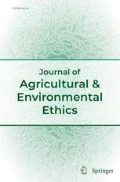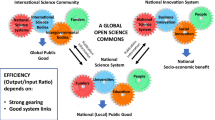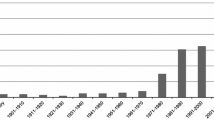Abstract
This paper discusses aspects of the relationship between the scientific community and the public at large. Inspired by the European public debate on genetically modified crops and food, ethical challenges to the scientific community are highlighted. This is done by a discussion of changes that are likely to occur to journalistic attitudes – mirroring changing attitudes in the wider society – towards science and scientific researchers. Two journalistic conventions – those of science transmission and of investigative journalism – are presented and discussed in relation to the present drive towards commercialization within the world of science: how are journalists from these different schools of thought likely to respond to the trend of commercialization? Likely journalistic reactions could, while maintaining the authority of the scientific method, be expected to undermine public trust in scientists. In the long term, this may lead to an erosion of the idea of knowledge as something that cannot simply be reduced to the outcome of negotiation between stakeholders. It is argued that science is likely to be depicted as a fallen angel. This may be countered, it is posited, by science turning human, by recognizing its membership of society, and by recognizing that such membership entails more than just commercial relations. To rethink its relationship with the public at large – and, in particular, to rethink the ideal of disinterested science – is an ethical challenge facing the scientific community.
Similar content being viewed by others
References
J. H. Altschull (1990) From Milton to McLuhan. The Ideas Behind American Journalism Longman New York and London
InstitutionalAuthorNameEuropean Communities (1998) ArticleTitle“Directive 98/44/EC of the European Parliament and of the Council of 6 July 1998 on the legal protection of biotechnological inventions.” Official Journal of the European Communities 41 IssueIDL 213 13–21
S. M. Friedman S. Dunwoody C. L. Rogers (Eds) (1986) Scientists and Journalists. Reporting Science as News The Free Press New York and London
S. M. Friedman S. Dunwoody C. L. Rogers (Eds) (1999) Communicating Uncertainty. Media Coverage of New and Controversial Science Lawrence Erlbaum Associates, Publishers Mahwah, NJ and London, UK
M. Gibbons (2001) ArticleTitleScience’s new social contract with society Nature 402 IssueIDsupp C81–C84 Occurrence Handle10.1038/35011576
S. Jasanoff B. Wynne (1998) Science and decisionmaking S. Rayner E. L. Malone (Eds) Human choice and climate change: the societal framework Battelle Press Colombus 1–87
A. Jones (2003) ArticleTitleCovering Science and Technology. An Interview with Cornelia Dean. November 22, 2002 The Harvard International Journal of Press/Politics 8 IssueID2 3–10 Occurrence Handle10.1177/1081180X02251044
H. E. Longino (2002) The Fate of Knowledge Princeton University Press Princeton, NJ and Oxford, UK
S. Macedo (1990) Liberal Virtues. Citizenship, Virtue, and Community in Liberal Constitutionalism Clarendon Press Oxford
R. K. Merton (1968) Social Theory and Social Structure The Free Press New York
H. Nowotny P. Scott M. Gibbons (2001) Re-Thinking Science. Knowledge and the Public in an Age of Uncertainty Cambridge and Malden Polity
Pilger, J., Hidden Agendas (Vintage, London, Sydney. Auckland and Parktown, 1999)
Porter, T., Trust in Numbers. The Pursuit of Objectivity in Science and Public Life (Princeton University Press, Princeton, NJ, 1995)
M. Schudson (1978) Discovering the News. A Social History of American Newspapers Basic Books USA
M. Schudson (1995) The Power of News Harvard University Press Cambridge, MA and London, UK
S. Shapin S. Schaffer (1985) Leviathan and the Air-Pump. Hobbes, Boyle, and the Experimental Life Princeton University Press Princeton, NJ
Author information
Authors and Affiliations
Corresponding author
Rights and permissions
About this article
Cite this article
Meyer, G. Journalism and Science: How to Erode the Idea of Knowledge. J Agric Environ Ethics 19, 239–252 (2006). https://doi.org/10.1007/s10806-005-6163-1
Accepted:
Issue Date:
DOI: https://doi.org/10.1007/s10806-005-6163-1




